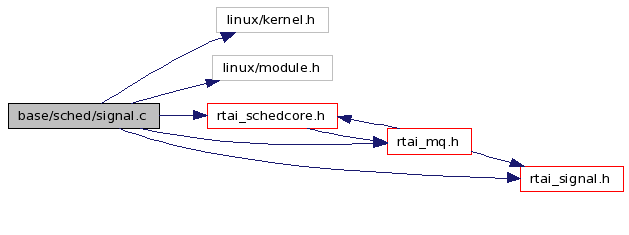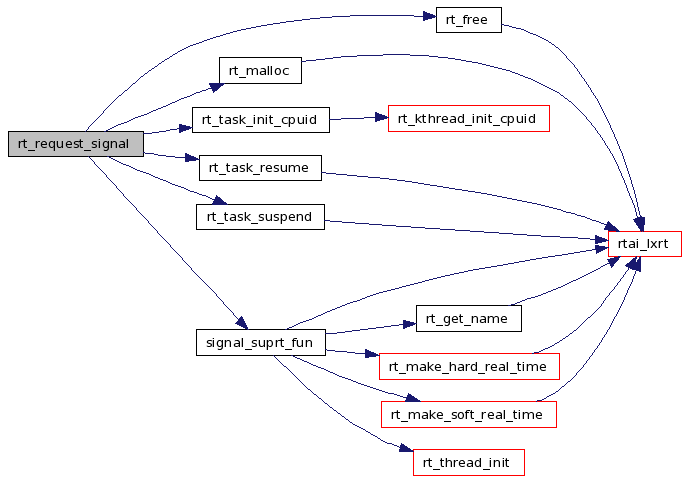
Include dependency graph for signal.c:

Go to the source code of this file.
Defines | |
| #define | MODULE_NAME "RTAI_SIGNALS" |
| #define | RT_SIGNALS ((struct rt_signal_t *)task->rt_signals) |
Functions | |
| MODULE_LICENSE ("GPL") | |
| RTAI_SYSCALL_MODE int | rt_request_signal_ (RT_TASK *sigtask, RT_TASK *task, long signal) |
| EXPORT_SYMBOL (rt_request_signal_) | |
| static void | rt_exec_signal (RT_TASK *sigtask, RT_TASK *task) |
| RTAI_SYSCALL_MODE int | rt_release_signal (long signal, RT_TASK *task) |
| Release a signal previously requested for a task. | |
| EXPORT_SYMBOL (rt_release_signal) | |
| RTAI_SYSCALL_MODE void | rt_trigger_signal (long signal, RT_TASK *task) |
| Trigger a signal for a task (i.e. | |
| EXPORT_SYMBOL (rt_trigger_signal) | |
| RTAI_SYSCALL_MODE void | rt_enable_signal (long signal, RT_TASK *task) |
| Enable a signal for a task. | |
| EXPORT_SYMBOL (rt_enable_signal) | |
| RTAI_SYSCALL_MODE void | rt_disable_signal (long signal, RT_TASK *task) |
| disable a signal for a task. | |
| EXPORT_SYMBOL (rt_disable_signal) | |
| RTAI_SYSCALL_MODE int | rt_signal_helper (RT_TASK *task) |
| RTAI_SYSCALL_MODE int | rt_wait_signal (RT_TASK *sigtask, RT_TASK *task) |
| EXPORT_SYMBOL (rt_wait_signal) | |
| static void | signal_suprt_fun (long args) |
| int | rt_request_signal (long signal, void(*sighdl)(long, RT_TASK *)) |
| Install a handler for catching RTAI real time async signals. | |
| EXPORT_SYMBOL (rt_request_signal) | |
| #define RT_SIGNALS ((struct rt_signal_t *)task->rt_signals) |
Definition at line 30 of file signal.c.
Referenced by rt_disable_signal(), rt_enable_signal(), rt_release_signal(), rt_request_signal_(), and rt_trigger_signal().
| EXPORT_SYMBOL | ( | rt_request_signal | ) |
| EXPORT_SYMBOL | ( | rt_wait_signal | ) |
| EXPORT_SYMBOL | ( | rt_disable_signal | ) |
| EXPORT_SYMBOL | ( | rt_enable_signal | ) |
| EXPORT_SYMBOL | ( | rt_trigger_signal | ) |
| EXPORT_SYMBOL | ( | rt_release_signal | ) |
| EXPORT_SYMBOL | ( | rt_request_signal_ | ) |
| MODULE_LICENSE | ( | "GPL" | ) |
| RTAI_SYSCALL_MODE void rt_disable_signal | ( | long | signal, | |
| RT_TASK * | task | |||
| ) |
disable a signal for a task.
| signal,>= | 0, is the signal. | |
| task | is the task which signal is enabled. |
Definition at line 179 of file signal.c.
References flags, RT_SIGNALS, and task.
| RTAI_SYSCALL_MODE void rt_enable_signal | ( | long | signal, | |
| RT_TASK * | task | |||
| ) |
Enable a signal for a task.
| signal,>= | 0, is the signal. | |
| task | is the task which signal is enabled. |
Definition at line 156 of file signal.c.
References flags, RT_SIGNALS, and task.
Definition at line 59 of file signal.c.
References flags, RT_SCHED_SIGSUSP, and task.
Referenced by rt_release_signal(), and rt_trigger_signal().
| RTAI_SYSCALL_MODE int rt_release_signal | ( | long | signal, | |
| RT_TASK * | task | |||
| ) |
Release a signal previously requested for a task.
| signal,>= | 0, is the signal. | |
| task | is the task for which the signal was previously requested. |
| 0 | on success. |
Definition at line 95 of file signal.c.
References rt_exec_signal(), RT_SIGNALS, and task.
Here is the call graph for this function:

| int rt_request_signal | ( | long | signal, | |
| void(*)(long, RT_TASK *) | sighdl | |||
| ) |
Install a handler for catching RTAI real time async signals.
| signal,>= | 0, is the signal. | |
| sighdl | is the handler that will execute upon signal reception. |
| 0 | on success. |
Definition at line 251 of file signal.c.
References rt_free(), rt_malloc(), rt_task_init_cpuid(), rt_task_resume(), rt_task_suspend(), signal_suprt_fun(), SIGNAL_TASK_STACK_SIZE, and sigsuprt_t::sigtask.
Here is the call graph for this function:

Definition at line 32 of file signal.c.
References MAX_PQUEUES, MAXSIGNALS, rt_malloc(), RT_SIGNALS, rt_task_resume(), and task.
Referenced by signal_suprt_fun(), and signal_suprt_fun_mq().
Here is the call graph for this function:

| RTAI_SYSCALL_MODE int rt_signal_helper | ( | RT_TASK * | task | ) |
Definition at line 190 of file signal.c.
References rt_task_suspend(), and task.
Here is the call graph for this function:

| RTAI_SYSCALL_MODE void rt_trigger_signal | ( | long | signal, | |
| RT_TASK * | task | |||
| ) |
Trigger a signal for a task (i.e.
send a signal to the task), executing the related handler.
| signal,>= | 0, is the signal. | |
| task | is the task to which the signal is sent. |
Definition at line 125 of file signal.c.
References flags, rt_exec_signal(), RT_SIGNALS, and task.
Here is the call graph for this function:

Definition at line 199 of file signal.c.
References flags, RT_SCHED_READY, RT_SCHED_SIGSUSP, rt_schedule(), and task.
Referenced by signal_suprt_fun(), and signal_suprt_fun_mq().
Here is the call graph for this function:

| static void signal_suprt_fun | ( | long | args | ) | [static] |
Definition at line 220 of file signal.c.
References rt_free(), rt_request_signal_(), rt_wait_signal(), sigsuprt_t::sighdl, sigsuprt_t::signal, sigsuprt_t::sigtask, and sigsuprt_t::task.
Here is the call graph for this function:

 1.4.7
1.4.7